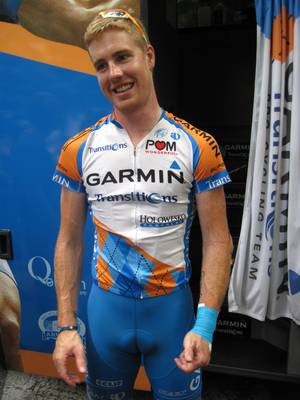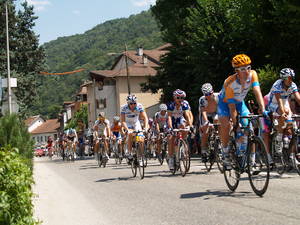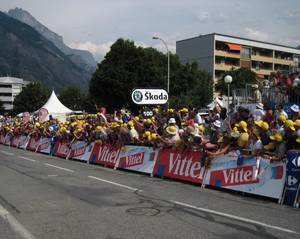The Views of a Sprint Cyclist
Interview with
Meera: - When talking about the Tour de France, we can't go without meeting the people that have to combine all the technology, nutrition, and fitness together to try and win stages, and jerseys. That's the cyclists themselves. I spoke to world class sprinter, Tyler Farrar, at the start of stage 10 to find out how he prepares...

Tyler: - You know, for me, there's a lot of focus on real maximum power training and high speed work. So we do a lot of sprint training, a lot of riding behind a scooter or a gurney, kind of motor pacing to simulate racing in the final sprints, and then we're doing a lot of work with the power metres to kind of register what kind of values I'm putting out, how that relates to where I was in my preparation before in previous Tour de Frances or Giro d'Italias, things like that.
Meera: - What's your goal when you're looking at all of this in the training sessions, and how much impact does that actually have when you're out riding?
Tyler: - I mean, at the end of the day, in racing, it's the results that count, not the numbers, but you can at least have a sense of where you're at in your training. I know for example that if I'm doing X number of Watts in a sprint, that means I'll be in about the same shape I was in, when I was doing that right before another race, that I won. So, it's kind of a nice gauge.
Meera: - So would you say then that power is more important to you, perhaps say, than monitoring things like heart rate or breathing?
Tyler: - It depends on who you are. As a sprinter, you know, sprints are so short, you're heart can't catch up to the workload, so it's power that really measures what you're actually doing.
Meera: - How do you handle things like climbs then? Yesterday was a mammoth climb. So how do you handle things like that?
Tyler: - I have to train for that just to get through the stages. You know, that's the biggest thing, making it inside the time cut, trying not to kill yourself too much. I actually spend a lot of time training in the hills too, just to kind of build the general condition a lot.
 Meera: - And I guess when it comes to cycling, it's more than just you as the person. It's your gear, it's your diet, so how much does that all play a role?
Meera: - And I guess when it comes to cycling, it's more than just you as the person. It's your gear, it's your diet, so how much does that all play a role?
Tyler: - It's all a factor. You know, bike races are won by really small margins. So, it's all the little things you can change and tweak that make the difference. It's how you're eating, how you're sleeping, how you're training, and if you can do little tweaks that change 1%, that could be the difference between first and fifth place, or something like that.
Meera: - Well there's a lot of developments when it comes to say, bike equipment. So is there a particular technological advance that you would say has really helped you?
Tyler: - Wheel technology has been incredible. They've really changed the wheels we're racing on in the last 10 years, so you know, bikes don't look the same as they did a decade ago. And there's a lot of limits on what a bike frame can be, how it's shaped, but you know, building faster and faster, lighter and stiffer wheels are what's really made a difference, I think.
Meera: - What about what you put inside you - so your diet; is there a key thing that you rely on perhaps, either before a ride, or during, that really helps?
Tyler: - As a team, we do an anti-inflammatory diet that is pretty thorough, and then during the race, it's just a matter of staying hydrated, keeping the food in you and you know, when it's as hot as it's been in this tour, staying on top of the hydration is life or death really. I mean, if you don't stay on top of it one day, your tour could be over.
Meera: - Well this tour has been particularly hot on certain days, especially I think Saturday, I heard even roads were melting.
Tyler: - Yeah. It's been really warm. It's been a pretty cool year up to this date, so not a lot of guys are used to it. We haven't raced in the heat a lot. It's been a bit of a shock to the system, but you expect that on the tour.
Meera: - I'm amazed when I hear about someone breaking their arm, or breaking a rib, and continuing to cycle for 200 kilometres. So what's your worst injury been that you've actually then pursued and finished the race with? Haven't you got a broken elbow now?
Tyler: - I have a broken wrist right now. I've had worse broken bones, but I haven't continued on with them. You know, I've broken my clavicle a few times and I've broken my wrist before when I haven't been able to race on it. This time, it's a really small fracture and I can kind of just grit my teeth and bare it, but yes, I've been racing since stage 2 now with a broken wrist.
Meera: - So, what's your worst injury ever been?
Tyler: - I've broken 5 collar bones, 3 wrists, and a rib.
Meera: - And you're still cycling.
Tyler: - All throughout my career. Not all at once, but you know...
Meera: - Well that would've been awful.
Tyler: - You add it all up, yeah.
Meera: - I guess actually, a key thing is being part of a team. So how much do you rely on your team to really protect you and keep you going, to help you do your final sprints?
Tyler: - It's huge. You know, there's a lot of fighting for position that goes on before  the final sprint itself, and that's where the team comes in to lead the sprint out and you know, let me sit back in the draft, and let them put me where I need to be. You know, it's a little harder to put it into practice because there is 20 other teams trying to do the same thing, but you know, we do the best we can.
the final sprint itself, and that's where the team comes in to lead the sprint out and you know, let me sit back in the draft, and let them put me where I need to be. You know, it's a little harder to put it into practice because there is 20 other teams trying to do the same thing, but you know, we do the best we can.
Meera: - So what are your aims for this particular tour?
Tyler: - The hope coming here was to win a stage. I've been second on one stage. Breaking my wrist derailed that a little bit because for me personally, the most opportunities were in the first week, and when I broke my wrist, I missed almost all the sprints because for the first three days, I couldn't really sprint.
Meera: - How did you break it?
Tyler: - There's just a lot of crashes on stage 2 and I was in one of them, and just hit the ground wrong.
Meera: - Has there been anything this year that's new, that's kind of revolutionised perhaps, the tour, or cycling, or the route?
Tyler: - I think the way that teams have progressed in the last few years has really changed cycling a lot. Teams function as a unit a lot more than they used to. Races used to be won by individuals a lot more, and now, it's truly team efforts to win races, almost always. Because the teams are functioning as a unit, the technology is becoming way more dispersed within the peloton, because before, the top rider might have the best stuff and then the team-mates would just have the leftovers.
Meera: - the second goods.
Tyler: - Yeah, and now, it's kind of you know, everyone's riding on the same stuff, everyone has really top equipment, raising the general level of the technology of the sport.
Meera: - And your thoughts for today?
Tyler: - It's going to be a hot one! And it's Bastille Day, so I think the French riders are going to be quite motivated today..









Comments
Add a comment